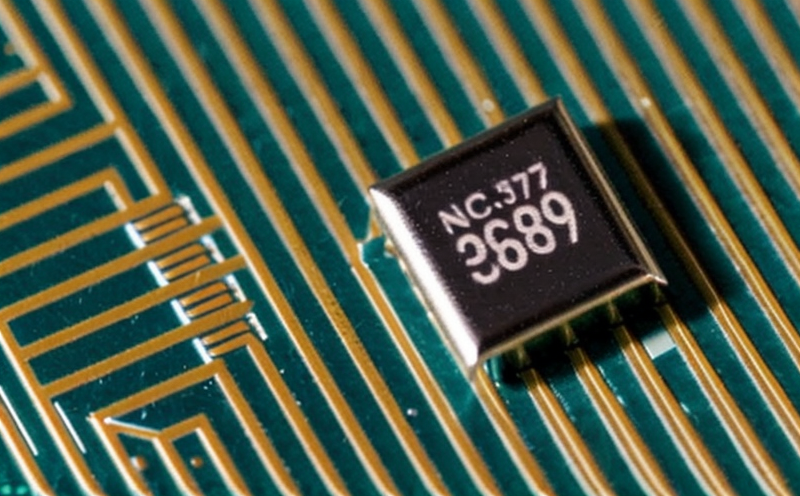JEDEC JESD22-B111 Board Level Reliability Lifetime Testing
The JESD22-B111 standard is a cornerstone in the semiconductor industry, specifically designed to evaluate the reliability and longevity of electronic boards. This testing protocol assesses the ability of a board to withstand various environmental stresses over extended periods, ensuring that it maintains its functionality and performance under real-world conditions.
The test simulates multiple stressors, including temperature cycling, thermal shock, humidity, and vibration. These conditions are critical for understanding how a board will perform in diverse environments, such as hot climates, cold storage facilities, or transportation through various terrains. By adhering to the JESD22-B111 standard, manufacturers can ensure their products meet stringent reliability requirements.
The testing process involves placing the boards into an environmental chamber where they undergo controlled cycles of high and low temperatures. This helps identify any potential weaknesses in the board's design or construction that could lead to failure. Additionally, humidity and vibration tests are conducted to simulate conditions that may occur during shipping or installation.
Quality managers and R&D engineers rely on this testing method to ensure their products meet industry standards and customer expectations. Compliance officers can use these results as part of the documentation required for regulatory compliance. The thorough nature of JESD22-B111 ensures boards are robust, reliable, and capable of withstanding the demands placed upon them in operational environments.
For procurement teams, this testing provides assurance that suppliers meet high reliability benchmarks. By leveraging JESD22-B111, organizations can enhance their supply chain resilience and reduce risks associated with product failures. This approach not only protects the integrity of products but also fosters trust within the industry.
In summary, JESD22-B111 testing is essential for maintaining high standards in semiconductor reliability and longevity. It offers a robust framework for evaluating electronic boards under extreme conditions, thereby ensuring they perform consistently across various applications.
Quality and Reliability Assurance
The quality and reliability assurance processes that accompany JESD22-B111 testing are crucial to the success of any semiconductor product. These processes ensure that not only does the board survive the rigorous environmental stresses but also meets all specified performance criteria.
Firstly, thorough specimen preparation is critical before testing begins. This involves cleaning the boards, ensuring they are free from contaminants that could affect test results. Proper labeling ensures traceability throughout the testing process and subsequent analysis.
Instrumentation plays a vital role in JESD22-B111 testing. Environmental chambers capable of precise temperature control and humidity management are essential for simulating real-world conditions accurately. Vibration tables help replicate the mechanical stresses experienced during transport or use, while thermal shock testers expose boards to rapid temperature changes.
Testing parameters are meticulously defined based on the requirements set forth in JESD22-B111. These include specific cycles of temperature variations, humidity levels, and vibration intensities. Compliance with these parameters ensures that the test results are valid and reliable.
Upon completion of testing, boards undergo a comprehensive evaluation to determine if they meet all specified criteria for reliability and longevity. Any deviations from expected performance trigger further investigation into potential causes and corrective actions.
The documentation generated during this process serves multiple purposes. It provides clear evidence of compliance with industry standards, supports claims about product durability, and aids in continuous improvement efforts within the organization. Regular reviews of testing protocols help maintain alignment with evolving technological trends and market demands.
By adhering to these stringent quality and reliability assurance measures, manufacturers can build confidence among consumers and stakeholders alike that their products are dependable and capable of meeting the highest standards.
Customer Impact and Satisfaction
The impact of JESD22-B111 testing extends far beyond just ensuring product reliability; it significantly enhances customer satisfaction by delivering superior performance and peace of mind. When customers choose products that have undergone rigorous testing, they are reassured about the quality and longevity of these products.
For quality managers overseeing production lines, successful completion of JESD22-B111 testing translates directly into enhanced product reputation and increased market share. It demonstrates a commitment to excellence and helps build trust with both internal stakeholders and external customers.
Compliance officers play a pivotal role in ensuring that all necessary tests are conducted according to established standards like JESD22-B111. Their efforts contribute towards maintaining regulatory compliance, which is vital for avoiding penalties and potential disruptions in business operations.
R&D engineers benefit greatly from this testing methodology as it provides valuable insights into areas where improvements can be made. Continuous refinement of test procedures ensures that future generations of products will continue to meet the highest reliability standards.
For procurement teams, JESD22-B111 testing serves as a safeguard against substandard components entering the supply chain. By selecting suppliers who have already demonstrated their ability to pass these stringent tests, buyers can mitigate risks associated with unreliable parts and poor quality materials.
In summary, the customer impact of JESD22-B111 testing cannot be overstated. It not only improves product performance but also fosters long-term relationships based on mutual trust and reliability.
Use Cases and Application Examples
- Aerospace Industry: Ensuring that avionics components can withstand extreme temperature fluctuations, humidity variations, and mechanical stress during space missions or high-altitude flights.
- Automotive Sector: Verifying the durability of electronic control units (ECUs) in vehicles subjected to harsh environmental conditions such as cold winters or hot summers.
- Medical Devices: Guaranteeing that implantable medical devices remain functional despite exposure to sterilization processes and varying body temperatures.
- Consumer Electronics: Testing home appliances like refrigerators, washing machines, and televisions to ensure they maintain performance standards even after prolonged use.
- Data Centers: Assessing the reliability of server boards in environments where continuous operation is critical for data integrity and availability.
- Telecommunications: Evaluating network infrastructure equipment like routers and switches to confirm their ability to operate reliably under diverse geographical conditions.
The versatility of JESD22-B111 testing ensures its applicability across numerous industries, making it an indispensable tool for maintaining the integrity and performance of semiconductor products.





